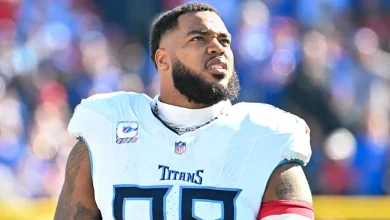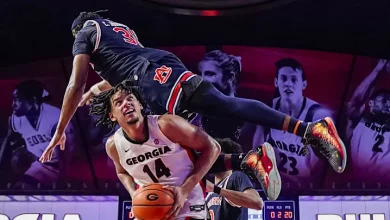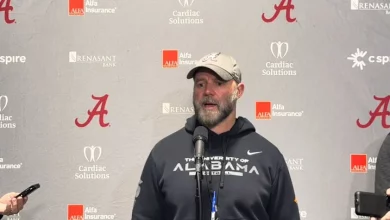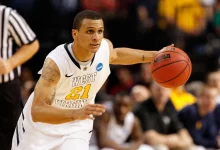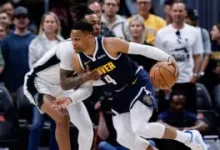Auburn’s Final Four loss to Florida highlighted defensive lapses, inconsistent shooting, and the need for stronger late-game execution under pressure.
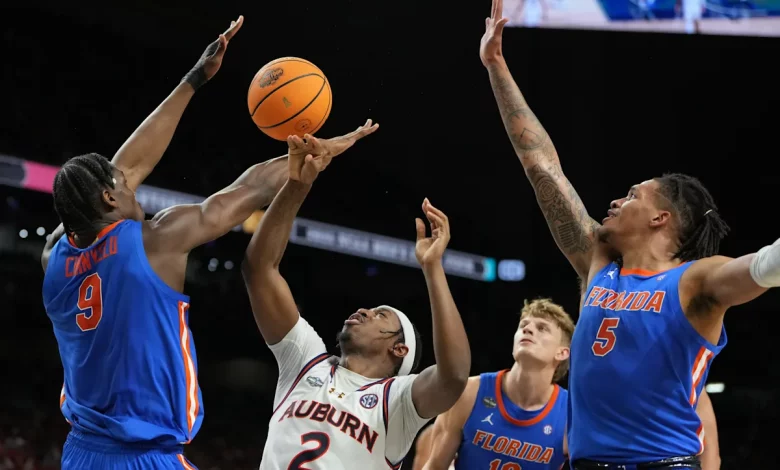
Auburn basketball’s remarkable run through the 2025 NCAA Tournament came to a heartbreaking end in the Final Four at the hands of SEC rival Florida. The loss, while gut-wrenching for players, coaches, and fans, also provided a clear lens through which to evaluate where things went wrong—and where the program goes from here.
The 2024–2025 Auburn Tigers will be remembered for their grit, talent, and unity. They battled through adversity all year, made clutch plays throughout March, and reached the Final Four—an accomplishment that solidifies Bruce Pearl’s program as one of college basketball’s elite. But the defeat to Florida, a familiar foe, exposed certain flaws that ultimately prevented Auburn from playing for a national title.
Let’s break down three key takeaways from the loss, examining the turning points, trends, and long-term implications for the Tigers.
1. Defensive Lapses at Crucial Moments Proved Costly
Auburn’s defense has been a defining strength under Bruce Pearl for years, often setting the tone with aggressive switching, intense pressure, and shot-blocking prowess in the paint. But in this Final Four matchup, defensive lapses at key moments allowed Florida to seize momentum—and the game.
Throughout the first half, Auburn did a solid job limiting transition points and contesting threes, but Florida’s backcourt began to carve out driving lanes as the game progressed. Mismatches on switches led to easy looks at the rim or wide-open perimeter shots, and late in the second half, Auburn’s rotations began to break down under pressure.
Florida capitalized with a flurry of points in the final five minutes—turning a tie game into a two-possession lead that Auburn couldn’t overcome.
“We lost track of their shooters a couple of times, and they made us pay,” said Coach Pearl in the postgame press conference. “In a game like this, every breakdown matters.”
In particular, Florida’s off-ball movement created headaches for Auburn’s wings, who struggled to navigate screens and maintain tight coverage. A couple of crucial miscommunications led to dagger three-pointers that stretched the Gators’ lead.
It wasn’t that Auburn’s defense was bad overall—it just wasn’t airtight when it needed to be. And in March, against teams like Florida who thrive on precision and execution, those few breakdowns become game-changers.
Long-term implication: Auburn will likely head into next season with a renewed focus on late-game defensive execution. Expect offseason emphasis on communication, switch discipline, and defending without fouling—especially with younger players stepping into bigger roles.
2. Inconsistent Shooting Undermined Offensive Rhythm
It’s a tale as old as tournament time: live by the jumper, die by the jumper. For much of the season, Auburn’s offense was at its best when it played inside-out—attacking the rim to draw fouls, collapse defenses, and create open looks for shooters. But in this game, the Tigers struggled to find rhythm from beyond the arc and failed to capitalize on their interior advantages consistently.
Auburn shot just 28% from three-point range in the game, and many of those attempts came early in the shot clock or off-balance. Credit to Florida’s defense—they chased shooters off the line and disrupted passing lanes—but Auburn didn’t adjust as quickly as needed.
When shots weren’t falling, frustration mounted. The offense became stagnant, relying too heavily on isolation plays or contested mid-range jumpers rather than quick ball movement and attacking the paint. The Gators were able to pack the lane, knowing that Auburn’s shooters weren’t in rhythm.
Players like Denver Jones and Chad Baker-Mazara, who had hit big shots in earlier tournament games, couldn’t get into a consistent flow. Their effort was unquestioned, but the ball just wouldn’t drop when Auburn needed it most.
“We had open looks, and we’ve made those all year,” said one player. “Tonight, they just didn’t fall.”
Long-term implication: Auburn’s staff may look to bolster perimeter shooting in the offseason, whether through development or the transfer portal. Consistency from deep is critical in tournament play, and teams that shoot well from three tend to go deep in March. Developing more reliable shooting threats will be a priority.
3. Late-Game Execution Needs Refinement
Auburn entered the Final Four battle-tested, having survived several close games during the season and the tournament. But when the pressure was at its peak, the Tigers struggled to execute in the closing minutes.
With the game within one possession at the under-4 media timeout, Auburn committed two costly turnovers and missed three straight shots—including a forced step-back three that led to a Florida fast-break layup. Those moments flipped the momentum permanently.
It wasn’t just a matter of missed shots—it was decision-making. Auburn had multiple opportunities to reset the offense, exploit mismatches, or draw fouls, but instead, possessions ended in rushed attempts or miscommunications. Florida, meanwhile, looked poised and polished in their execution, running high-efficiency sets and getting the ball into their best player’s hands.
“We needed to be better in those moments—more composed,” Pearl admitted. “That’s something we’ve done well all year, but tonight, it just got away from us.”
Late-game execution is a fine art—especially in the NCAA Tournament. Every screen, cut, and pass carries extra weight. Auburn has the talent to be elite in crunch time, but this game showed the importance of preparation and trust under pressure.
Long-term implication: Expect Pearl and his staff to incorporate more situational basketball into offseason practices. Whether it’s last-minute offense, sideline-out-of-bounds sets, or two-for-one scenarios, the Tigers will likely focus heavily on tightening up their end-of-game playbook.
Final Thoughts: No Shame, Only Motivation
While the loss to Florida hurts—and will continue to sting throughout the offseason—it doesn’t erase the incredible season Auburn put together. A Final Four appearance is a monumental achievement, and it further cements Bruce Pearl’s Tigers as one of the premier programs in the country.
But this group, and this staff, won’t be satisfied with Final Four banners. They want championships. And this game may be the fuel that lights the fire heading into next season.
The returning core is talented. The incoming recruiting class is promising. The transfer portal remains a tool that Auburn has used successfully year after year. The foundation is there for another deep run in 2025–2026—only this time, with the lessons of this loss shaping every practice, every rep, and every game.
Here’s what Auburn fans can hang their hat on: the culture is strong. The fight is real. And the hunger is only growing.
Three Takeaways in Summary:
- Defense wins championships—but lapses lose games. Auburn’s defense is elite, but it must be sharper in critical moments.
- Offensive balance matters. Relying too heavily on perimeter shots without consistent success will always be risky in March.
- Late-game poise is essential. In the Final Four, every possession is a pressure cooker, and execution must be flawless.
This wasn’t the ending Auburn hoped for—but it could be the beginning of something even bigger.
War Eagle.
Would you like this turned into a graphic, social media post thread, or formatted like a blog post? I can also add player quotes or advanced stats if you’d like to get even more detailed.



